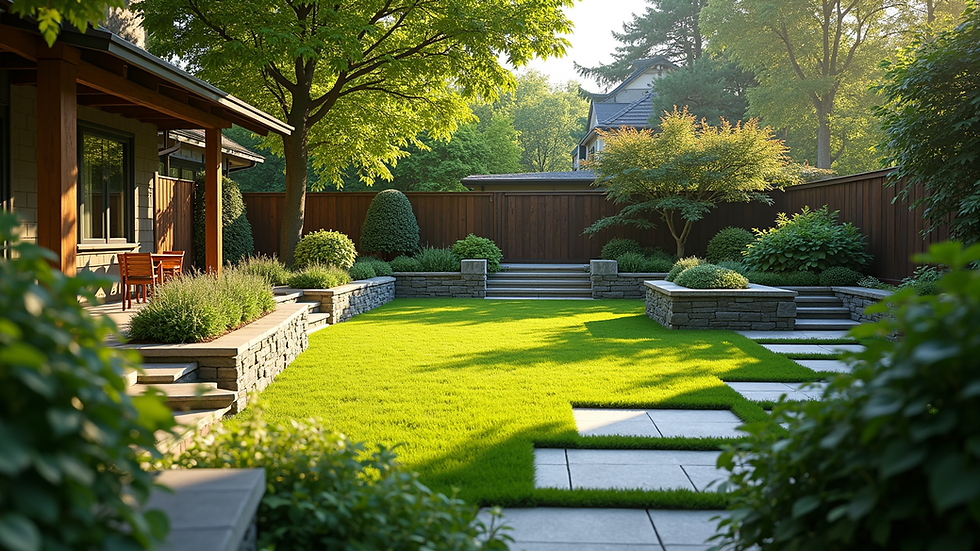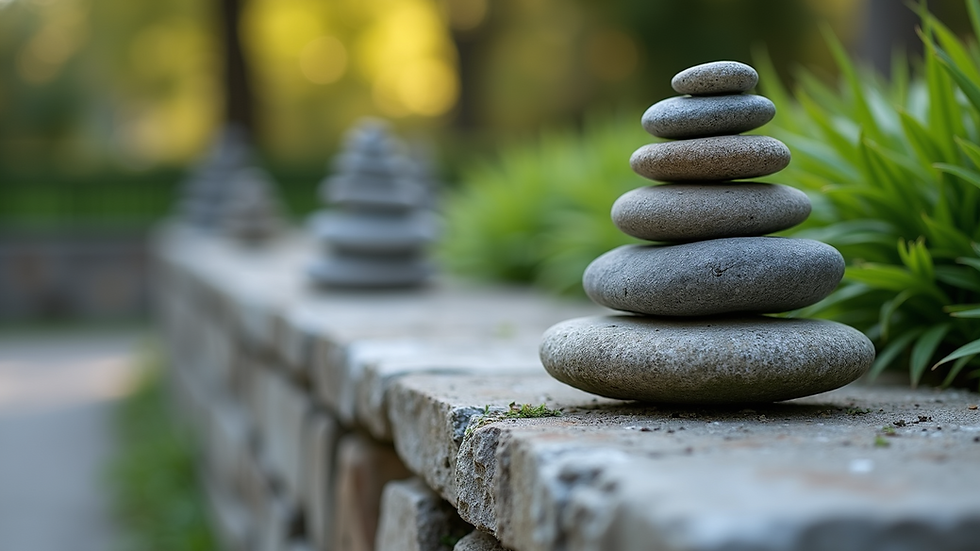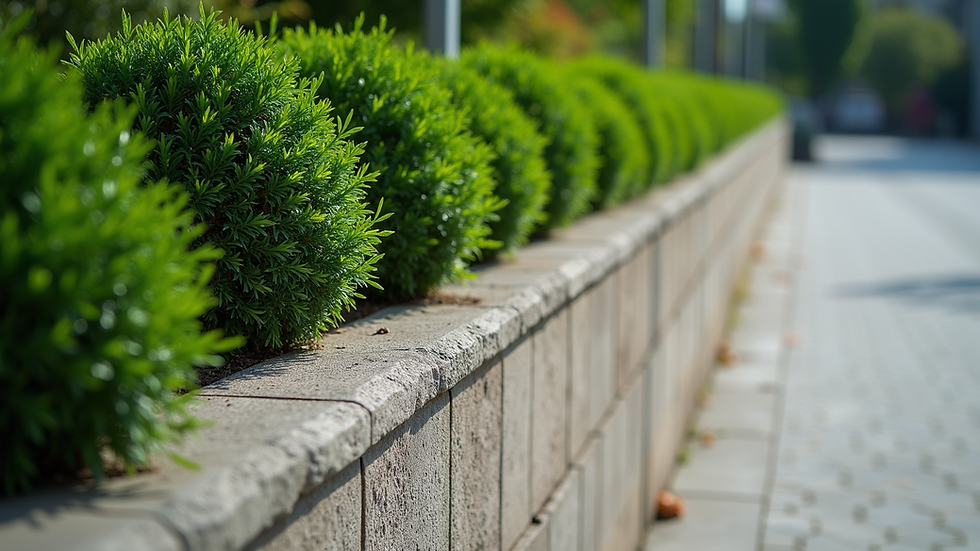Understanding the Key Benefits of Retaining Wall Structures
- Monarch Masonry Team

- May 25, 2025
- 4 min read
Retaining walls are more than just functional structures; they play a vital role in landscaping, erosion control, and enhancing property aesthetics. If you're considering investing in retaining walls, it's crucial to understand their benefits and types. This guide will help you appreciate the advantages of these structures while also providing practical information on their installation and maintenance.
Importance of Retaining Walls
Retaining walls serve several essential purposes, primarily focused on stability and design. By holding back soil, they can prevent erosion and protect your property from potential damage. They create flat areas that are perfect for gardens, patios, or even pools. In many cases, these walls also enhance the visual appeal of landscapes, making them an attractive addition.
Using retaining walls can optimize the use of sloped land. For instance, instead of dealing with an uneven terrain, homeowners can transform it into usable space. A well-designed retaining wall can become a focal point in a yard, showcasing plants and other landscaping features.

Moreover, retaining walls increase the value of a property. Properly designed and constructed walls can improve the overall look of your home, which can be a major selling point if you're planning to move. According to the National Association of Realtors, good landscaping can yield a return on investment of approximately 100-200%.
Different Materials Used in Retaining Wall Construction
The materials used for retaining walls significantly impact their durability, aesthetic appeal, and cost. Common materials include:
Concrete: Known for its strength and versatility, concrete can be molded into various shapes. It's ideal for taller walls due to its structural integrity.
Stone: Natural stone offers a rustic charm and blends beautifully with outdoor settings. It's typically used for lower walls or decorative elements.
Timber: Offering a warm, organic look, timber is commonly used for residential gardens. However, it requires more maintenance than stone or concrete.
Brick: Durable and visually appealing, brick walls can enhance the architectural style of a home. They provide durability and aesthetic value.
Choosing the right material depends on the specific needs of your project and your overall landscaping vision. For detailed guidelines on retaining wall materials, visit Monarch Masonry's Retaining Wall Construction.

What are the 4 types of retaining walls?
Understanding the types of retaining walls can help you select the right option for your needs. The four main types are:
Gravity Walls: These rely on their weight to hold back soil. They are usually made from concrete or stone and can handle moderate loads.
Cantilever Walls: These have a thicker base and a lever arm that helps provide stability. This design is efficient for taller walls and typically constructed from reinforced concrete.
Anchored Walls: These walls use cables or anchors embedded in the earth behind them to provide additional support. They are ideal for steep slopes or where soil is unstable.
Sheet Piling: Made from wood, steel, or vinyl, these walls are driven into the ground and are effective in holding back water and soil, particularly in waterfront applications.
Each type comes with its own set of advantages depending on the slope, soil conditions, and intended use. Consider consulting a professional to determine the best option for your situation.

Cost Considerations for Retaining Walls
When planning a retaining wall project, understanding the cost implications is essential. Factors contributing to the overall expense include:
Material Costs: Prices can vary widely depending on whether you choose concrete, stone, timber, or brick.
Labor Costs: Professional installation is often recommended, particularly for larger or more complex walls. Labor costs can depend on your location and the contractor's experience.
Site Preparation: Additional expenses might arise from needing to grade the land and remove any existing vegetation or debris.
Overall, the average cost of retaining wall installation ranges from $15 to $50 per square foot, depending on the materials used and complexity of the project. Be sure to get multiple quotes and discuss your budget openly with contractors to find the best solution.
Maintenance Tips for Retaining Walls
Once installed, maintaining your retaining wall is key to its longevity and performance. Here are some helpful tips:
Inspect Regularly: Check for cracks, bulging, or signs of water damage. Early detection can prevent costly repairs.
Drainage Systems: Ensure that proper drainage is maintained to avoid water buildup behind the wall, which can lead to failure. Installing weep holes or drainage pipes can be beneficial.
Vegetation Management: Keep plants away from the wall to reduce pressure and moisture accumulation. However, using plants with deep roots at the base can help stabilize the soil.
Overall, regular upkeep can significantly extend the life of your retaining wall, ensuring it continues to serve its purpose effectively.

Enhancing Your Landscape with Retaining Walls
Retaining walls offer incredible benefits that can elevate your landscaping. They’re not just practical; they can also add character and charm to your outdoor space. Whether you're looking to prevent erosion, create flat usable areas, or simply improve the look of your garden, investing in a retaining wall is a wise choice.
Their versatility means they can fit any design concept, from modern to rustic. By utilizing the right materials and designs, you can craft a wall that enhances your property aesthetically while serving its functional purpose.
Choosing a qualified contractor will ensure your retaining wall is not only beautiful but also built to last. Whether you're dealing with steep slopes or need aesthetics in a flat landscape, there is a retaining wall solution for you.
Investing in professional guidance and quality materials will guarantee you enjoy the many advantages a strong, well-designed retaining wall can provide over the years.
Ready to Get Started?
Let’s build something solid. Contact Monarch Masonry today for a free estimate or consultation.
📞 +1 (416) 649-6419



Comments